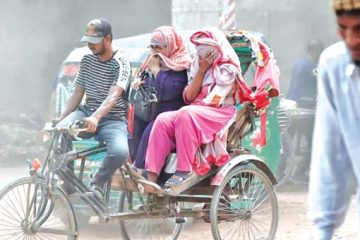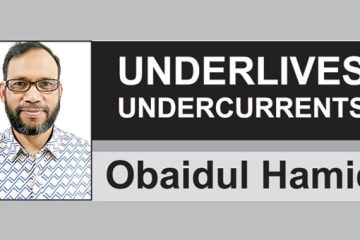Commentary
Sheikh Hasina’s cabinet: Gutsy but risky
Mahfuz Anam
She promised to surprise us with her choice of the cabinet, and she did. Though the media was able to get some predictions right but generally speaking she outwitted us all. Not only in choosing the individuals but equally in giving them portfolios, Prime Minister (PM) Sheikh Hasina showed a boldness and a spirit of moving away from the trodden path that is rare in our politics. However, in her ‘thinking out of the box’ she has also taken some very serious risks that can make or break her government’s prospect for success.
Whatever be our reaction to the cabinet we will, and must, give it a reasonable time to perform before we make any conclusion as how correct the PM was in choosing the cabinet that she did. So today’s comments therefore are preliminary ones, based more on our impression and existing reputations of the ministers concerned.
In terms of new faces one couldn’t have asked for more. As to clean reputation, except for a few, she is well on target. She also scores very high on getting some grassroots based politicians, who are not well known in Dhaka circles, into the helm of affairs. It is in the area of experience that she runs her greatest risk. Though she brushed aside this point by saying that in her last cabinet (1996-2001) most people were first-time ministers and, in her view, they did well. So why can’t it work again? Well, she is right, and she is also wrong. Everyone is not Matia Chowdhury, SAMS Kibria or ASHK Sadique. There were other first-timers who let her down terribly and brought her government and her party to the dust. If her point is correct then there is hardly any value to be placed on experience.
In terms of reputation for honesty, which, admittedly, is crucial given the history of most ministers of the past government, her choices score very high. There is one particular selection that worries us, someone we have written about in the past, and through whose ministry huge amounts are likely to be spent during the tenure of this government. Without prejudging his future performance we say that the independent media will keep him, and the likes of him, under special scrutiny as we support the PM to make determined moves to remove corruption.
In choosing the cabinet a very important question that needs to be asked is of efficiency. Can these ministers deliver? Can they manage and run their ministries? The answer must wait. We must allow sufficient time for them to perform before we can justifiably say who is and who is not efficient. However, it is a point that must be made earlier on that while sincerity and honesty are of course very important, for the goals set out in the Awami League’s manifesto to be achieved cabinet members will have to be highly efficient.
Generally, Bangalees are bad managers. Our politicians are no exception. Public representatives love to respond positively whenever demands are made for new schools, bridges, health centres and the like without much thoughts on the budget, more importantly about their operating costs. All such demands are justified and necessary. But the question is do we have the money to build them, and do so now? Even if we do, is there no better use of that scarce resource? These are questions that all public representatives, especially ministers, must remember every time they face the public. What must be realised today is that core to good governance is good financial practice, the starting point of which is “you must cut your coat according to your cloth” and not vice versa.
One of the ironies of the developing world is that poorer a country the higher is the percentage of waste. Corruption is not the sole reason for fund misuse. Wastage is a very important component of it, which is caused even by well-meaning and honest leaders. Preventing wastage in project implementation will serve both to prevent inefficiency and give greater value for our money. Here again comes the question of good management practices that saves money, ensures efficiency, guards against corruption and wastage, and allows the government to do more with the same limited resources. Will the new ministers be able to bring such management discipline into their work?
One idea that can perhaps be looked into is immediate, short and compact course on management for most of the ministers, especially one that helps them keep track of project expenditure. The initiative could come from finance minister who will be most benefited if all ministries become more proficient in managing their projects and keeping more transparent and organised books of account. The suggestion may seem trivial but could make a most vital difference in the ultimate success of this government.
Prime Minister Sheikh Hasina has gambled heavily on her two first-time women ministers. We can justly be proud that we are the first country in Saarc and perhaps among the very few in the world who have given both the home and foreign portfolios to women at the same time. It is another example of Sheikh Hasina’s attempt to build a bold, new and gender sensitive face of Bangladesh’s government.
Compared to previous foreign ministers Dr Dipu Moni, trained both in medicine and law, will definitely present a far more sophisticated face of our country than before. She is well-educated, well-read and is known to be a quick learner with a high degree of common sense. Her obvious lack of experience in foreign affairs (Well which of our previous foreign ministers had any experience?) can well be made up for if she keeps an open mind and takes wise counsel from the pool of former foreign secretaries and ambassadors that AL is replete with. Given her quick mind and especially her modesty, she will, we are certain, be a fast learner and become adept in her task in no time. While we are willing to repose our confidence in her ability, we must warn her that the tasks she has been entrusted with are an extremely challenging one, especially in the present complex world and in our neighbourhood. There is no scope for her to underestimate the difficulties, the complexities and the relentless pressure that she will face. She needs also to remember that she will be constantly under media focus, especially because of her portfolio, and her slightest misstep will have repercussion far beyond our borders, repairing which may be far more difficult than would logically seem.
Home Minister Sahara Khatun is well known for her honesty, integrity and commitment to democracy. But she is also a party activist with deep wounds. As a street level worker she was on the receiving end of police brutality let lose by the previous regime. Her deep scares do not make for the right temperament of a good home minister. We had a glimpse of it the other day when in reply to a journalist’s question on BNP’s claim about AL’s supporters attacking their workers she replied by saying, “Do you not remember what they did to us in the past?” Is such an answer helpful in moving forward the new government’s agenda? Though she said she would investigate the allegations, she added, “I know these are results of internal quarrels of BNP.” Well, if she has already drawn a conclusion, what good will her investigation do? As the head of the ministry that is most sensitive in the political sense such comments are unhelpful at best and disastrous at worst. It will be her police that will tackle the opposition in the street and her astuteness and dexterity in handling them will greatly determine the trust and confidence that Sheikh Hasina wants to build with the opposition.
As for other ministers, we will comment later, except to say that we find bizarre the appointment of Dilip Barua as the minister for industries. How can a man who spent his whole life castigating industrialists as exploitative capitalists, can be a good choice to release a floodgate of confidence among existing and future investors?
People of Bangladesh have given the best gift imaginable to the Awami League and to its leader Sheikh Hasina — a far bigger mandate then even the most optimistic prediction. Just as the mandate is big, so also is the public expectation. It is our hope that the new cabinet will do its best to rise to the occasion, and it must. The truth is Bangladesh cannot afford another failed government.
Courtesy: thedailystar.net







